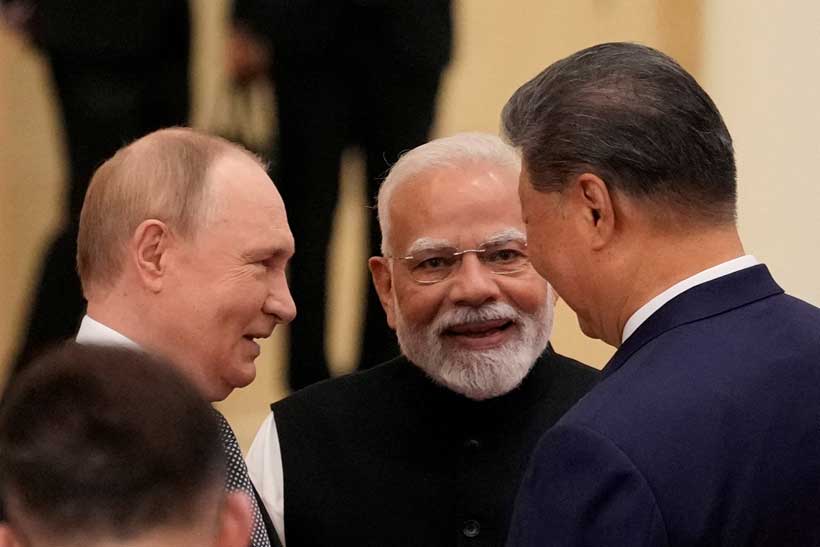The world of politics in 2025 is marked by both familiar struggles and new dynamics that reflect the ever-changing global order. While the great powers continue to vie for influence, emerging nations are demanding more space at the table, and global institutions are grappling with how to stay relevant in a multipolar world. From the growing rivalry between the United States and China to Europe’s efforts at cohesion, from the Middle East’s geopolitical balancing acts to Africa’s rise as a hub of growth and innovation, the political landscape has become more interconnected, unpredictable, and consequential than ever before.
The United States remains a dominant player but faces challenges to its global leadership. Domestic divisions, political polarization, and debates over the role of America abroad continue to shape its foreign policy. While Washington is seeking to rebuild alliances and strengthen partnerships, particularly with NATO and Indo-Pacific allies, its influence is increasingly contested by China. Beijing, with its massive economy and ambitious Belt and Road projects, is positioning itself as an alternative center of power. The competition between these two giants has spilled into technology, trade, military influence, and even space exploration, raising the stakes for global stability.
Europe finds itself at a crossroads. The European Union has made progress toward strategic autonomy, investing in defense, digital sovereignty, and green energy transitions. However, internal challenges remain, from the lingering effects of Brexit to tensions over migration and economic inequality. Europe is striving to strike a balance between aligning with the United States and charting its own independent course in world affairs. Its ability to maintain unity while responding to crises will determine whether it remains a central global player or continues to be overshadowed by more assertive powers.
The Middle East in 2025 reflects a blend of cautious optimism and persistent volatility. Normalization agreements between Israel and several Arab states have reshaped regional diplomacy, offering opportunities for trade and cooperation. However, longstanding conflicts in Syria, Yemen, and Palestine continue to simmer, while Iran’s nuclear ambitions and influence in regional politics remain a source of tension. Oil-rich Gulf states are diversifying their economies and seeking leadership roles in technology and climate change, highlighting their desire to move beyond the traditional identity of being solely energy exporters. Yet, the region’s complex web of alliances and rivalries ensures that peace remains fragile.
Africa’s political importance has surged as the continent undergoes rapid demographic and economic growth. Nations such as Nigeria, Kenya, and South Africa are emerging as influential voices on issues ranging from trade to climate change. With its young population, vast natural resources, and growing tech hubs, Africa has become a focal point for both Western and Eastern powers eager to expand their influence. However, the continent also faces challenges such as governance issues, corruption, and security threats from extremist groups. How Africa navigates these hurdles will shape not only its future but also the global order.
Asia remains the epicenter of much of the world’s political energy. In addition to China’s growing assertiveness, nations such as India, Japan, and South Korea are stepping up their roles in global governance. India’s expanding economy and technological prowess have boosted its clout, and New Delhi is increasingly acting as a counterweight to Beijing. Japan and South Korea continue to strengthen alliances with the United States while investing heavily in defense and technological leadership. Southeast Asia, caught between great power rivalries, is seeking to maintain its neutrality while benefiting economically from both sides.
Technology itself has become a geopolitical battleground. Nations are not only competing for natural resources and markets but also for dominance in artificial intelligence, quantum computing, and cybersecurity. The race to control the technologies that will define the future is as important as traditional territorial disputes. This has led to concerns about digital authoritarianism, surveillance, and the fragmentation of the internet into rival blocs. International efforts to set standards and regulations are underway, but deep divisions remain about how technology should be governed.
Climate change is another factor reshaping politics. The need for global cooperation to address rising temperatures, natural disasters, and environmental degradation has forced leaders to place sustainability at the forefront of their agendas. Developing nations are demanding more support from wealthier countries to adapt to climate challenges, while activists and younger generations are pressing for bold action. The politics of climate are not only about saving the planet but also about determining who pays the price and who reaps the benefits of green transitions.
The role of international institutions in 2025 is under scrutiny. The United Nations, World Trade Organization, and other bodies have faced criticism for being slow, bureaucratic, and often ineffective in addressing crises. Calls for reform have grown louder, with emerging nations insisting on greater representation. The struggle to adapt these institutions to a rapidly changing world reflects broader debates about fairness, justice, and legitimacy in global governance.
Domestic politics also continue to shape international behavior. In democracies, rising populism and nationalist movements are influencing foreign policies, often pushing governments toward isolationism. In authoritarian regimes, centralization of power and restrictions on freedoms remain prominent strategies to maintain control, though citizen movements and digital activism are challenging these systems. The interplay between domestic pressures and global responsibilities underscores the complexity of political decision-making in 2025.
Despite the challenges, there are also opportunities. Diplomacy is being redefined, with digital platforms allowing for faster communication and engagement between leaders and citizens. Global coalitions are forming around specific issues, such as health security and renewable energy, that transcend traditional political divisions. Multilateralism, though strained, remains a vital mechanism for addressing shared challenges. The politics of 2025 is not just about rivalry but also about cooperation in the face of existential threats.
FAQs
What is the main political rivalry in 2025?
The competition between the United States and China dominates global politics, with both nations competing for influence in technology, trade, and security.
How is Europe adapting to new global challenges?
Europe is striving for greater unity and strategic autonomy, focusing on defense, digital independence, and climate policies while managing internal divisions.
What role does Africa play in global politics?
Africa’s young population and growing economies make it an increasingly influential player, though governance and security challenges remain.
Why is technology central to politics today?
Control of emerging technologies such as AI and quantum computing has become a key measure of power, influencing everything from economic strength to national security.
How is climate change shaping politics?
Climate change has become a global political issue, driving nations to cooperate on sustainability while debating responsibility and fairness in climate action.
Conclusion
Global politics in 2025 reflects a world that is more interconnected, more contested, and more complex than at any point in recent history. The balance of power is shifting, with new voices rising alongside established players. While rivalry and competition dominate headlines, cooperation remains essential to addressing shared challenges such as climate change, cybersecurity, and pandemics.
The political choices made today will not only shape national destinies but also the future of humanity as a whole. In this dynamic era, the success of global politics depends on whether leaders can balance ambition with responsibility, competition with cooperation, and power with justice.






